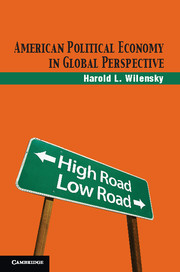Appendix
Concepts and Measures
Published online by Cambridge University Press: 05 June 2012
Summary
Consensual Democracies vs. Confrontational Democracies
See Wilensky, 1976: 21–25, 48, 50–51, for measures of degree of corporatism, and pp. 56–68 for measures of political effects; and Wilensky, 1983, for elaboration of the types of corporatism and their policy effects. For earlier theoretical work on the concept “corporatism,” see Schmitter, 1974. My model of democratic corporatism accents four interrelated criteria: (1) bargaining channels for the interaction of strongly organized, usually centralized economic blocs, especially labor, employer, and professional associations with centralized or moderately centralized government obliged to consider their advice; (2) a blurring of old distinctions between public and private; (3) a broad scope of national bargaining going beyond labor-market issues and resulting in; (4) the integration of social and economic policy and a greater chance to reach consensus and implement policy. Germany is an ambiguous case of corporatism; Switzerland, a marginal case of corporatism without labor (see Wilensky, 1976: 51, and 1981: 379, n. 42; and Pempel and Tsunekawa, 1979). The numerical scores for corporatism used in regressions are slightly different from the types of corporatism in Tables 2, 7, and 8, especially for France, Japan, and Switzerland.
“Democracy” is a system in which people choose leaders through competitive elections made possible by a rule of law and freedom of association and related civil liberties (cf. Schumpeter, 1942: 250–302; Dahl, 1989). “Pluralism” is defined as a polity in which many relatively autonomous groups representing a real division of values and interests compete for power within a nation-state. All democracies are pluralist. But authoritarian regimes often have elements of pluralism; they tolerate a degree of autonomy for selected groups such as the church, the monarchy, the military, or industry. Pluralism is thus not the same as democracy. Finally, “democratic corporatism” is a subtype of democracy focused on differences among democracies in their national bargaining structures. It is distinguished from the authoritarian version of corporatism of Mussolini, Franco, or Peron. And, of course, both democracy and authoritarian regimes are distinguished from totalitarian systems, which aim to eliminate all independent associations, all zones of privacy – Nazi Germany, Stalinist USSR (Linz, 1975), North Korea.
- Type
- Chapter
- Information
- American Political Economy in Global Perspective , pp. 271 - 276Publisher: Cambridge University PressPrint publication year: 2012



